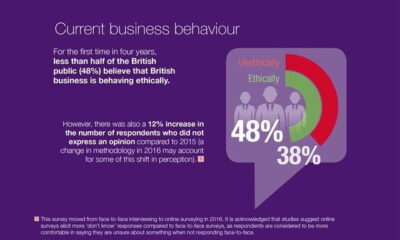

Economy
Over 90% of financial executives support global ethical standards
A new study has shown that while financial executives recognise the importance of ethical behaviour in the industry, with 91% supporting a set of global ethical standards, there is still a gap between this belief and the industry’s practices.
The Chartered Financial Analysts (CFA) Institute, which conducted the research, said, “Addressing culture must be a top priority for creating a resilient and trustworthy financial services industry.”
Despite the importance placed on ethical standards more than half of those questioned think career progression at their firm would be difficult without being “flexible” on ethical standards. In addition, just 37% believe their firm’s financials would improve if the ethical conduct of employees improved.
The CFA Institute notes that prior to the 2008 financial crisis financiers were encouraged to chase rapid earning growth. This short-term profit priority led to extreme risk taking in many firms but since the crisis questions are being asked about whether the industry can shift its culture to become more risk-averse and client-centric.
Over two-thirds of firms represented in the survey have taken steps to raise awareness about the importance of ethical conduct over the last three years. This included strengthening a formal code of conduct, evaluating employee behaviour and career and financial incentives that encourage adherence to ethical standards.
The CFA Institute argues that building a culture based on integrity and financial knowledge helps mitigate risk and makes for a more resilient business. However, a silo businesses culture remains with 62% of respondents admitting that their colleagues know very little about what goes on in departments beyond their own.
John Rogers, the president and CEO of the CFA Institute, said, “[The survey] shows signs of a shift in culture recognising the benefits of global ethical standards and industry knowledge, and addressing agency issues.
“If we are to move the industry forward it is incumbent upon everyone within the industry to align their personal and organisational values with those that serve clients, shareholder and societal needs. Aspiring to adopt these values will create more resilient firms and a stronger future for finance.”
Whilst firms have made efforts in recent years the industry still has a long way to go. Out of 18 industries the financial services industry is the least trusted to do the right thing, according to the report.
The organisation concluded that there was little doubt that sincere attempts are being made to change but added that financial firms must still overcome tensions if they are to adopt a strong, risk-proof and client-serving culture.
Further reading:
Report: improve investment transparency to avoid selling unsuitable products
Investment firms must ‘build a culture where ethical practices are valued’
Transparency, simplicity and honesty is urgently needed in investment
Responsible investors need to let the light in
66% of investment professionals unaware of impact investment






























